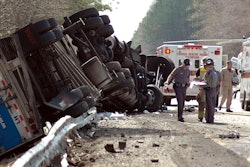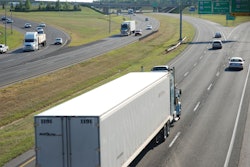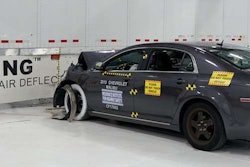The Owner-Operator Independent Drivers Association is leading a coalition of more than 30 trucking-related trade associations to oppose four trucking mandates that have been proposed in Congress recently: underride guards, speed limiters, automatic emergency braking systems and a liability insurance minimum increase.
The group of 31 associations penned a letter to Congress on Monday urging them to reject the four bills as they work on the next highway funding bill.
“Unlike our coalition partners, supporters of these mandates know virtually nothing about trucking,” said Todd Spencer, president and CEO of OOIDA. “The unfortunate reality is these mandates would likely decrease safety, not improve it, while imposing astronomically high costs on a wide variety of industries. That’s the point we’re conveying to Congress.”
The letter states the four bills “would impose tens of billions of dollars in unfunded mandates on American businesses engaged in trucking” and adds that they would “mandate extremely costly and excessively burdensome one-size-fits-all requirements.” The coalition goes into detail about the problems it sees with each of the proposed mandates.
- H.R. 1511/S. 665, the Stop Underrides Act: This bill would mandate the installation of front, side and rear underride guards on all trailers with a gross vehicle weight rating greater than 10,000 pounds, as well as single unit trucks with a GVWR greater than 10,000 pounds and a carriage that is more than 22 inches above the ground.
The group says certain trailers, specifically lowboys and car haulers, can’t be fitted with side or rear underride guards. Additionally, they note that no front underride equipment is currently on the market “because the concept lacks any practicality.” Finally, the coalition expresses concern over side underride guards strong enough to achieve the wanted safety value would add weight and take away from load capacity.
- S. 2033, the Cullum Owings Large Truck Safe Operating Speed Act of 2019: This bill would require all heavy-duty trucks to be equipped with speed limiters with a speed limit of 65 miles per hour. The coalition says, if passed, the bill would create speed differentials in 35 states.

“Decades of highway research shows speed differentials result in more interactions between truck drivers and other road users,” the letter states. “Studies have consistently demonstrated that increasing interactions between vehicles directly increases the likelihood of crashes.”
- H.R. 3773, the Safe Roads Act: This bill would require new commercial trucks to be equipped with automatic emergency braking systems (AEB). Cost is the biggest factor the coalition voices concern over. The letter states that studies show it is not yet clear if the benefits of these systems outweigh the costs.
The group also notes that AEB technology is still relatively new and “can create new challenges and dangers for drivers, such as false or unexpected system activation.”
- H.R. 3781, the INSURANCE Act: This bill would increase the liability insurance minimum for trucking companies from $750,000 to more than $4.9 million. The coalition says the bill, if passed, would impose significant costs on the trucking industry.
The group cites studies that indicate the currently liability minimum covers damages in all but 0.06% of crashes.









